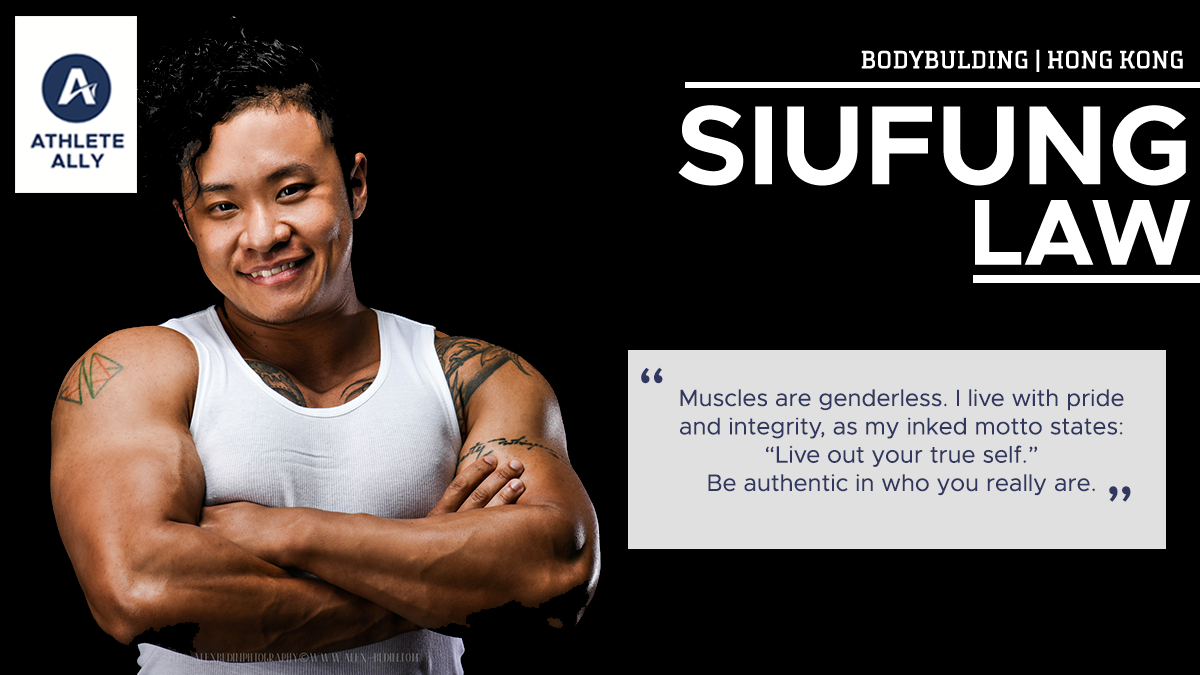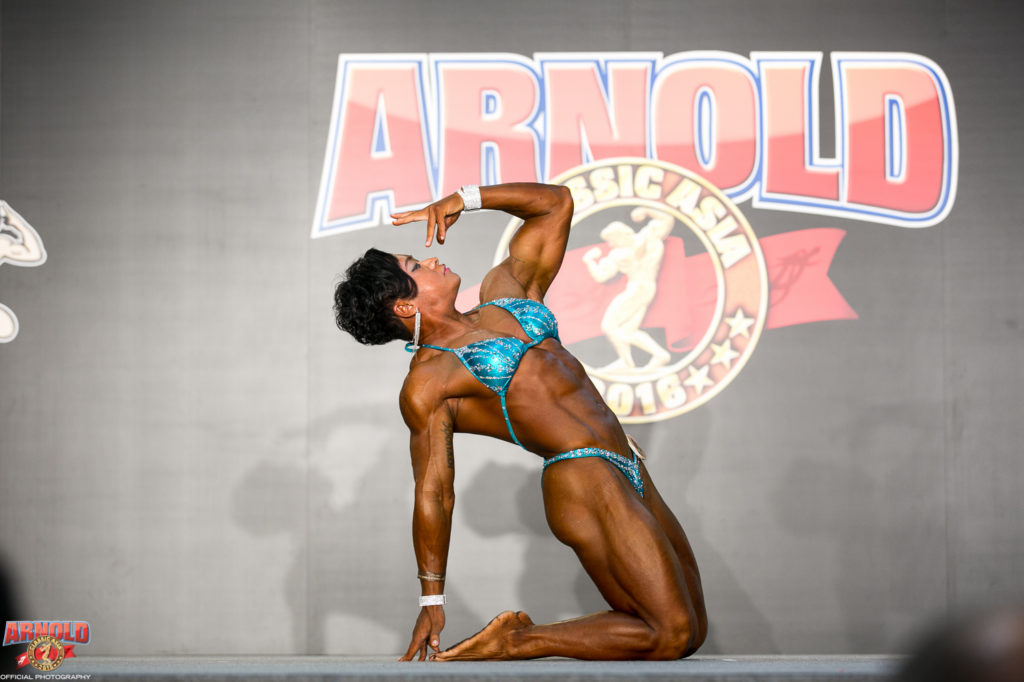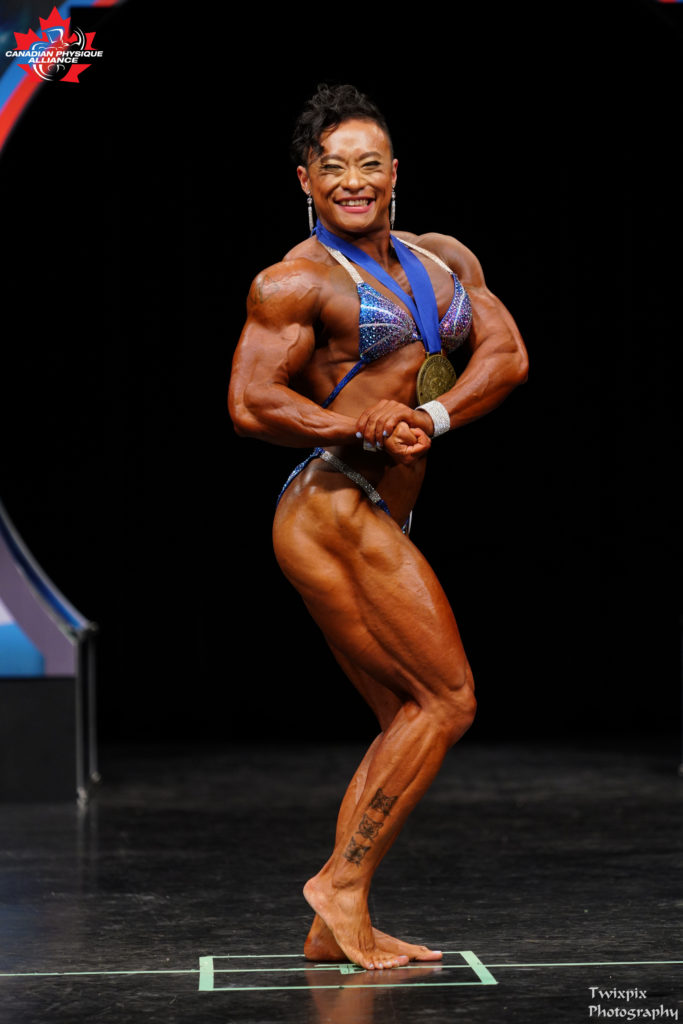Genderfluid Pro Bodybuilder Siufung Law: Live Out Your True Self

By: Siufung Law, pro bodybuilder and Athlete Ally Ambassador
Sport is where I discovered who I truly am. Without bodybuilding, I would not be who I am today. My passion in sports changed as the way I identified changed. It involved a process — a process of becoming a better athlete and person.
I identified as a lesbian when I was in high school at an all-girls school. In Hong Kong, where there was a lack of sports culture and an abnormal obsession with academic achievements, being a female athlete either meant that you were not going to excel academically, or that you were a tomboy. My father, who was the Vice Principal of my school, also held these beliefs, and so I wasn’t encouraged to participate in sports.
I only started to devote myself to sports when I was in college. I joined my school’s cross-country and rowing teams, and later became one of the members of the Hong Kong Women’s Dragon Boating Team. As I moved from one sport to another, I realized that I had always wanted to participate in strength sports. Although I excelled in marathon running and loved being in the water, I was always obsessed with working out at the gym. I wanted to look stronger and more masculine.
My gender identity was gradually changing as well. I wanted to be identified socially as a man, and to be called “Sir” instead of “Madam.” I came out as a transgender man at 23.
At 24, I quit dragon boating and decided to try bodybuilding. I enjoyed the sport and knew that it was my calling. In my first year of training, I did not think of competing. The mere thought of wearing a bikini on stage was horrifying to me, as I always thought of a bikini as feminine clothing.
For a while, I was stuck between my gender identity and my passion in sports. Due to my legal gender as a female, I could only participate in the women’s division. I am a competitive person, but I also wanted to be seen as a man socially. This contradiction inspired me to research transgender studies, through which I asked the question, “To what extent can a person embody both gender identities within one body?”

When I was 25, I participated in my first bodybuilding contest overseas. I was the overall champion in the Open Division of Women Physique in 2015. The victory was unprecedented — I did not only overcome the fear of wearing a bikini, but I had also realized how much I enjoyed looking and performing feminine on stage. I loved my femininity as much as my masculinity; I loved to be identified as a woman and a man, depending on the context, and I could no longer call myself as a transgender man.
That’s when I began to search for new identities. My academic pursuits led me to meet a genderfluid artist who visited Hong Kong. Their fluidity in gender expression and sexuality fascinated me, and not long after, I began to identify as genderfluid and non-binary.
I participated in several bodybuilding contests in both Women Physique and Women Bodybuilding division, and became an International Federation of BodyBuilding and Fitness professional female bodybuilder in 2018.
Being a female competitor is not easy, as women often receive less prize money and less magazine exposure than men. Recently, women have been required to reduce their muscularity in contests so as to be more marketable in the bodybuilding industry. Women bodybuilders, in particular, are often condemned as being too muscular and “wanting to be men.” As a result, these women often have to highlight their femininity and heterosexuality to fight against misogyny. This further solidifies the heteronormativity within the bodybuilding culture, which is contrary to what I experience in the sport.

There is in fact a greater diversity in the identification and gender expression of women within the bodybuilding world. I myself have experienced both discrimination and support in reaction to how I identify myself. I was once mistaken as a male-to-female transsexual competing in a women’s division because of my masculine gender expression. From the incident, I recognize the necessity to create a more gender equal and diverse environment in bodybuilding.
I therefore devoted myself to advocating for gender equality and fluidity in sports, and became a sports ambassador of Gay Games Hong Kong 2022, hoping to create a gender-friendly environment by bringing in a third-gender category in most of our sports. I am honored to become an ambassador of Athlete Ally, and to work to end homophobia and transphobia in sports.
I live with pride and integrity, as my inked motto states: “Live out your true self.” Be authentic in who you really are.
Want to receive stories like this in your inbox? Sign up here.